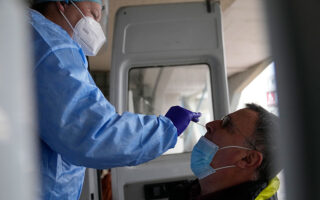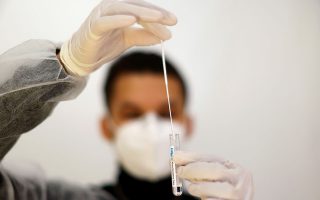Isolation, gaps in Greek labor legislation affect patients with long Covid syndrome

Long Covid syndrome is not only significantly under-diagnosed by doctors in Greece, it is also often underestimated by the social environment of those affected.
Microbiologist Vasiliki Kazakou, who lives in Tripoli, contracted coronavirus for the third time last September. The infection was mild, but in early November, several weeks after her recovery, the first complications appeared. “Suddenly, one night, I couldn’t walk, my legs wouldn’t hold me up. The next morning, I started to lose control of my arms as well, I had difficulty holding things. In addition, my blood pressure had risen dangerously and my blood sugar became dysregulated. The tests also showed fluid in my heart.”
She still hasn’t recovered, and the neurological symptoms persist. “Several doctors unfortunately do not know the mechanisms of the disease,” she tells Kathimerini. “There are more than a few who attribute the symptoms to psychological causes. “It’s all in your head,” they say. One hears the same from some of their relatives and friends. “Come on, you’re overreacting.” No, I’m not. I had two C-sections and in eight days I was back at work, I got breast cancer and I didn’t stop working for a moment. This time I’m really worried….”
Neurological disease
“Neurological problems are the most common and the most persistent,” confirms pediatrician Eleni Iasonidou, president of the Greek association of long Covid sufferers. “It is no coincidence that in the US, Long Covid syndrome is now recognized as the third most severe neurological disease.” She became ill in 2020 (before vaccines) and still has dysautonomia, a disorder of the normal functioning of the autonomic nervous system.
“In the early days, only patients with severe disease and hospitalization were admitted to the post Covid clinics. But it has been established by recent research that 90% of people who will develop the syndrome have had mild illness. So with pressure from our union, thankfully hospitals are no longer ignoring us,” she continues.
“But for the Labor Ministry we remain invisible. The labor market is uncharted, there is no information for employers, no protocols have been established, which has been done in several countries, such as Belgium. In severe cases, sufferers are forced to give up or change jobs. Those with milder symptoms continue to work, but at the expense of the remainder of their lives: in order to be functional at work, they underperform at home.”
The frequent Covid outbreaks add new sufferers to the already long list of long Covid syndrome sufferers. “Indeed, there is a problem and a serious one,” admits pathologist Georgios Pappas, a member of the National Committee for Public Health Emergencies.
“And it’s going to keep getting bigger. In recent weeks, the daily new Covid cases have averaged 6,500 – the reported ones, not the ones that are not picked up by the Hellenic National Public Health Organization’s (EODY) radar. Even if one in 1,000 sufferers develop long Covid, that means at least six people’s lives will be “ruined” for years to come.
Many of those who seek medical help will face problems of valid diagnosis and treatment and acceptance by their families; some will not even be believed by their parents. And, of course, there is a gap in employment issues. It is only right that patient organizations in many countries in Europe and America should demand that this syndrome be treated as a kind of disability.
The state must meet the needs of these fellow citizens. It was only last March that long Covid was recognized as a disease with a relevant code in the e-Government Center for Social Security (IDIKA), but only for prescription purposes. We have a long way to go in recognizing the employment rights of sufferers.
A prerequisite is that our country should have long Covid treatment centers with at least five medical specialties for the most common symptoms. Does this not sound utopian for Greece and the understaffed and overburdened health service? “Yes, it is difficult,” Pappas agrees. “But a network of doctors could be created to deal with such cases. Many of us are willing to help. As long as the necessary framework is in place.”
“Social acceptance and job security for long Covid sufferers is like a footrace. Each country is at a different point along the route. Greece is still at the starting point.” says Eleni Iasonidou.





